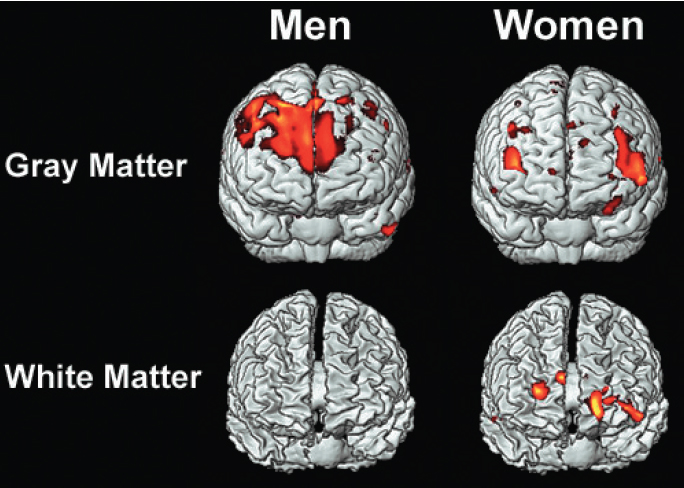3.2.3 Perception and Gender
Printed Page 86
Perception and Gender
Get your family or friends talking about gender differences, and chances are you’ll hear most of them claim that men and women perceive interpersonal communication differently. They may insist that “men are cool and logical” while “women see everything emotionally.” But the relationship between gender and perception is much more complex. For example, through magnetic resonance imaging and positron emission tomography, we have learned that the structure of the brain’s cerebral cortex differs in men and women (Frederikse, Lu, Aylward, Barta, & Pearlson, 1999). Researchers maintain that this difference enables men to perceive time and speed more accurately than women and to mentally rotate three-dimensional figures more easily. The difference in cerebral cortex structure allows women to understand and manipulate spatial relationships between objects more skillfully than men do and to more accurately identify others’ emotions. Women also have a greater ability to process information related to language simultaneously in both of the brain’s frontal lobes, resulting in higher scores on tests of language comprehension and vocabulary (Schlaepfer et al., 1995).

But whether variation in brain structure actually translates into differences in interpersonal communication is hotly debated among scholars. Linguist Deborah Tannen (1990) argues that men and women perceive and produce communication in vastly different ways. For example, Tannen suggests that when problems arise, men focus on solutions, and women offer emotional support.
Consequently, women perceive men’s solutions as unsympathetic, and men perceive women’s needs for emotional support as unreasonable. In contrast, researchers from communication and psychology argue that men and women are actually more similar than different in how they interpersonally communicate (Hall, Carter, & Horgan, 2000). Researchers Dan Canary, Tara Emmers-Sommer, and Sandra Faulkner (1997) reviewed data from over 1,000 gender studies and found that if you consider all of the factors that influence our communication and compare their impact, only about 1 percent of people’s communication behavior is caused by gender. They concluded that when it comes to interpersonal communication, “men and women respond in a similar manner 99% of the time” (p. 9).
Despite the debate over differences, we know one thing about gender and perception for certain: people are socialized to believe that men and women communicate differently. Within Western culture, a long tradition exists of emphasizing communication differences between men and women. People believe that women talk more about their feelings than men, talk about “less important” issues than men (women “gossip,” whereas men “discuss”), and generally talk more than men (Spender, 1984). But in one of the best-known studies of this phenomenon, researchers found that this was more a matter of perception than real difference (Mulac, Incontro, & James, 1985). Two groups of participants were given the same speech. One group was told that a man had authored and presented the speech, while the other was told that a woman had written and given it. Participants who thought the speech was a woman’s perceived it as having more “artistic quality.” Those who believed it was a man’s saw the speech as having more “dynamism.” Participants also described the “man’s” language as strong, active, and aggressive, and the “woman’s” language as pleasing, sweet, and beautiful, despite the fact that the speeches were identical.

Given our tendency to presume broad gender differences in communication, can we improve the accuracy of our perception? Yes—if we challenge the assumptions we make about gender and if we remind ourselves that both genders’ approaches to communication are more similar than different. The next time you find yourself thinking, “Oh, she said that because she’s a woman,” or “He sees things that way because he is a man,” question your perception. Are these people really communicating differently because of their gender, or are you simply perceiving them as different based on your beliefs about their gender?